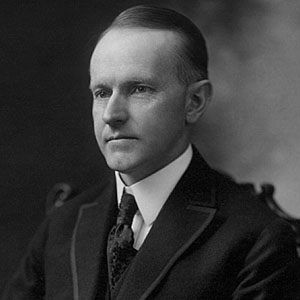John Calvin Coolidge Jr. served as the 30th President of the United States. Known as “Silent Cal,” the conservative Republican kept the country grounded during the excess of the Roaring Twenties.
Early Life
John Calvin Coolidge Jr. was born in Plymouth Notch, Vermont, on July 4, 1872. After graduating from Amherst College with honors, Coolidge studied law and opened a law practice in Northampton, Massachusetts. On October 4, 1905, Coolidge married Grace Anna Goodhue, a teacher at the Clarke School for the Deaf. They had two sons, one of whom died at the age of 16.
Political Career
Coolidge entered politics at the local level. In 1898, he was elected to the Northampton city council. He went on to serve in the Massachusetts House of Representatives, as mayor of Northampton, as a state senator and as lieutenant governor.
In 1918, Coolidge won election as governor of Massachusetts. He became a national political figure for his handling of a Boston police strike and resulting riots. Coolidge called in the state guard to restore order and then refused to rehire the striking police officers. He famously told union leader Samuel Gompers that “there is no right to strike against the public safety by anybody, anywhere, anytime.” At the next Republican National Convention, Coolidge was nominated to serve as the running mate to Warren G. Harding. The Republican ticket easily won the election over James Cox and Franklin D. Roosevelt.
Presidency
Coolidge became President when Harding unexpectedly died in 1923. He learned of the President’s death while vacationing in Vermont, with his father, a notary public, doing the honors of swearing him into office.
After the scandals of President Harding’s Administration came to light, Coolidge worked to restore faith in the government by rooting out corruption. His conservative policies favored business interests, tax cuts, and limited government spending.
Coolidge was elected President in his own right in 1924. He beat the Democratic candidate, U.S. Representative John W. Davis, and the Progressive Party candidate, U.S. Senator Robert M. La Follette. While in office, Coolidge was enormously popular, largely for maintaining the status quo. Coolidge also served as a grounding figure as the country went through significant technological and social advances. In 1924, his approval rating was more than 54 percent. As described by Alfred E. Smith, Coolidge was “distinguished for character more than for heroic achievement. His great task was to restore the dignity and prestige of the Presidency when it had reached the lowest ebb in our history … in a time of extravagance and waste….”
While President Coolidge’s reserved and quiet demeanor stood in stark contrast to the mood of the times, he was also known for his humor and wit. As told by his wife, Grace Goodhue Coolidge, a young woman sitting next to Coolidge at a dinner party informed him she had bet she could get at least three words of conversation from him. He dryly responded, “You lose.”
Coolidge chose not to run for re-election in 1928. He died at the age of 60 in 1933.








